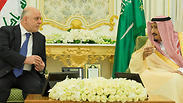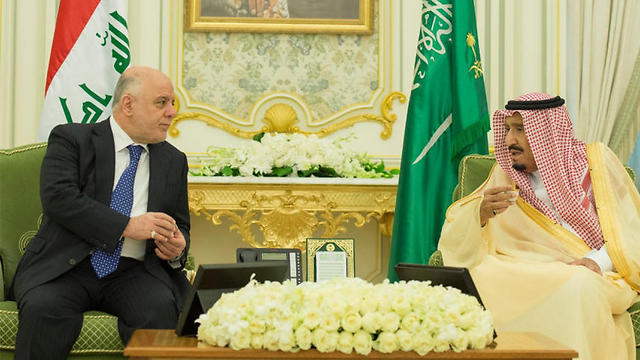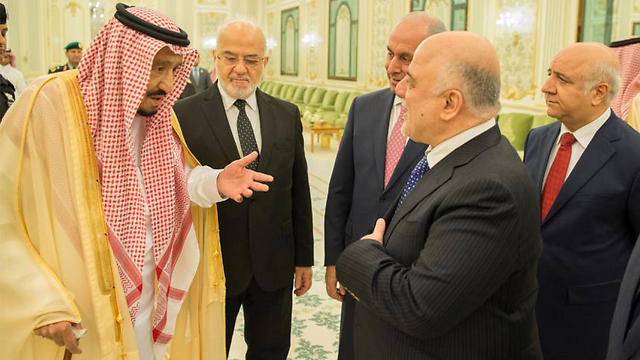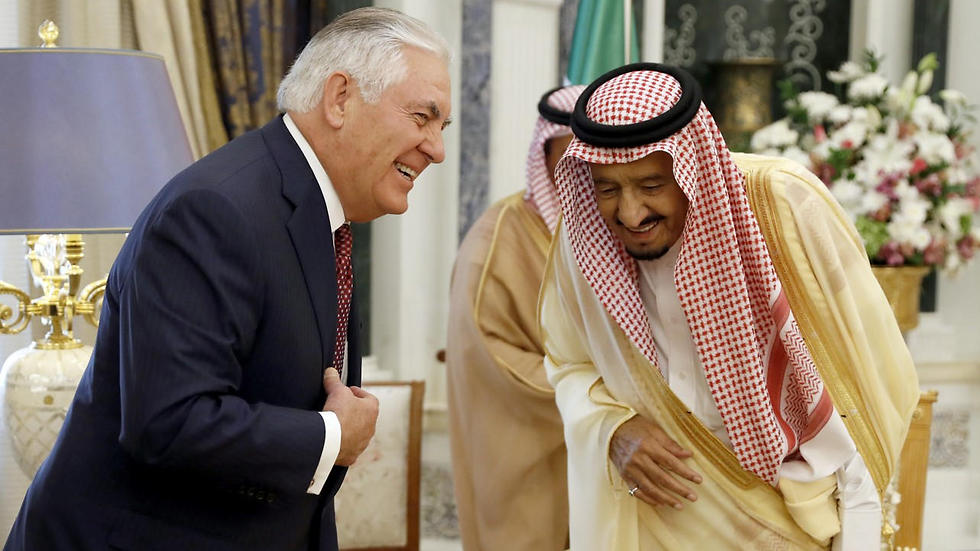

US pushes Saudi Arabia, Iraq on united front to counter Iran
As Riyadh and Baghdad work to renew ties after decades of estrangement, Secretary of State Tillerson urges Saudi, Iraqi leaders 'to expand vital relationship for the stability of the region' as part of bigger effort to combat growing Iranian influence in the Middle East.
RIYADH - US Secretary of State Rex Tillerson on Sunday promoted a Trump administration goal of uniting Saudi Arabia and Iraq in common cause to counter Iran's growing assertiveness in the Middle East.
Tillerson participated in the inaugural meeting of the Saudi Arabia-Iraq Coordination Committee, along with Saudi King Salman and Iraqi Prime Minister Haider al-Abadi, telling the leaders that the event highlighted the improving ties between the longtime rivals and showed "the great potential" for further cooperation. He noted the August reopening of a major border crossing and the resumption of direct flights between Riyadh and Baghdad.
"Both represent the beginning of what we hope will be a series of even more tangible actions to improve relations and strengthen cooperation on a host of issues," he said. "Your growing relationship between the kingdom and Iraq is vital to bolstering our collective security and prosperity and we take great interest in it."

The United States is "grateful for this progress and urge you to expand this vital relationship for the stability of the region," Tillerson said. "The United States stands ready to support continued cooperation between Saudi Arabia and Iraq and we congratulate you."
His participation in the meeting comes as US officials step up encouragement of a new axis that unites Saudi Arabia and Iraq as a bulwark against Iran's growing influence from the Persian Gulf to the Mediterranean Sea. Amid the push for that alliance, the Iraqi government is struggling to rebuild recently liberated Islamic State strongholds and confronts a newly assertive Kurdish independence movement.
History, religion and lots of politics stand in Tillerson's way, but both the Saudi king and the Iraqi prime minister appeared optimistic about the prospects.
"We are facing in our region serious challenges in the form of extremism, terrorism as well as attempts to destabilize our countries," Salman said. "These attempts require our full attention. ... We reaffirm our support for the unity and stability of our brother country of Iraq."
Abadi expressed pleasure with "the thriving relations between our two brotherly countries."
"We are open and we want to move away from the past," he said. "The region cannot tolerate any further divisions. Interference in the internal affairs of other state should stop."

Shiite-majority Iraq and Sunni-led Saudi Arabia, estranged for decades after Saddam Hussein's 1990 invasion of Kuwait, have tried in recent years to bridge their differences. Saudi Arabia reopened its embassy in Baghdad in 2015 after a quarter century. The first visit by a Saudi foreign minister to Baghdad came in February this year, followed by the border crossing reopening in August and resumption of direct flights between the capitals suspended during the Gulf War.
Over the weekend, the Saudi oil minister, Khalid al-Falih, made a high-profile appearance at Baghdad's International Fair, and held talks with his Iraqi counterpart, Jabar al-Luabi.
Nevertheless, the relationship is plagued by suspicion. Iran's reported intervention in Iraq's semiautonomous northern Kurdish region, after last month's much criticized vote for independence in a referendum, has deepened the unease.
The Sunni-led kingdom, which had opposed the US-led invasion of Iraq in 2003, has long been anxious about Iran's footprint in Shiite-majority Iraq and its network of allied militias there. Saudi Arabia has consistently described Iraq as an Arab nation, to differentiate it from Shiite but non-Arab Iran.
The kingdom is also looking to Iraq as a potential trading partner and as a major investment opportunity amid reconstruction efforts in cities such as Mosul, which were devastated by the war against the Islamic State group.
















